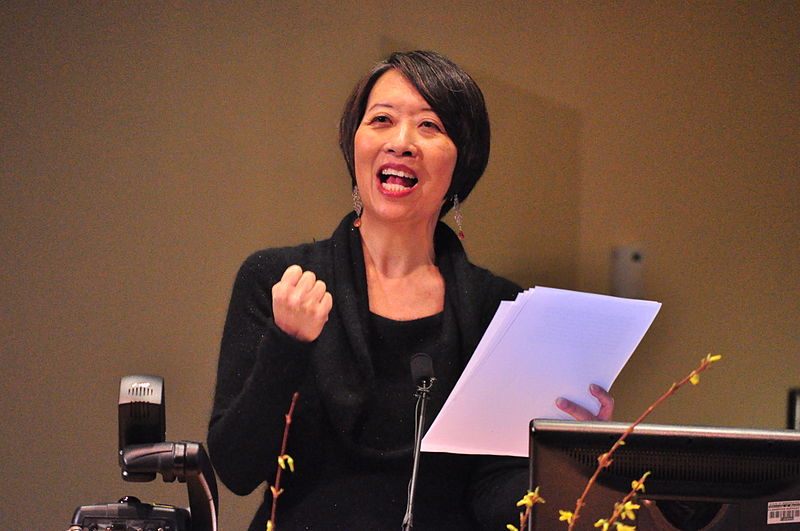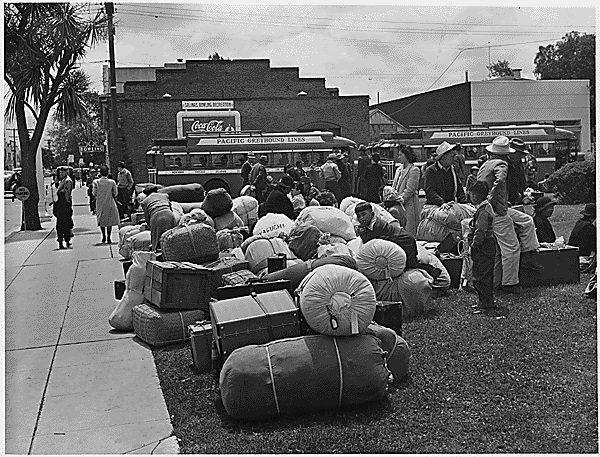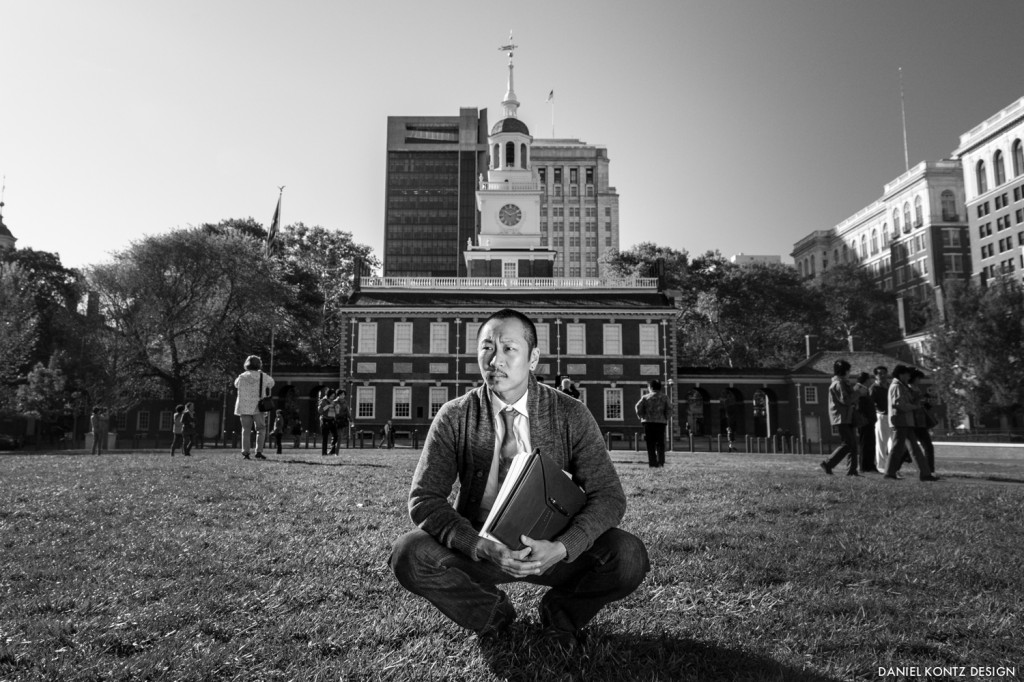HOLD THESE TRUTHS has seen many sold-out performances at Plays & Players, where it is running through March 1, 2015. [Read the Phindie review.] Before the play opened, playwright Jeanne Sakata spoke to Henrik Eger about the play’s development and themes.
After her visit to Philadelphia for the opening,Sakata gave another interview on her profoundly moving play about the young Gordon Hirabayashi and his battle with the Supreme Court to stop the injustices of the Japanese American internment camps during World War II.

Eger: Hold These Truths has been performed all over the US. How do you account for its success?
Sakata: I have been amazed at the response and can only guess at the answer, but I like to think that it is first of all because of Gordon himself, who seems to fascinate audiences just as much as he fascinated me when I first discovered his story. When I began researching him, his personality just shone through the letters that he wrote during WWII, letters that were a major source of inspiration to me in writing the play. I felt he was an extraordinary person in so many ways, but also someone with a wonderfully engaging, warm, everyman quality that audiences could easily identify with, and root for.
I also think that people are amazed to discover the story itself. A few years ago, in 2012, President Obama posthumously awarded Gordon the Medal of Freedom, but his name is still unfamiliar to many Americans. Simply put, his is a great and quintessentially American story, one which still speaks powerfully to our current times, with a lot of unpredictable twists and turns that I could never have invented. It’s full of highs and lows, both tragedy and humor. And finally, I know it’s because of the incredible artists and mentors—directors, actors, designers, dramaturges—who I’ve been fortunate enough to work with during the development and production of the play, and who have taken the script and created such amazing theatrical magic from it. I can never thank them enough for giving the play the wonderful life that it’s had for the last eight years.
Eger: In 2007, you first called your play Dawn’s Light: The Journey of Gordon Hirabayashi, but changed it to Hold These Truths in 2012. What made you change the title?
Sakata: At one point in the play’s progression, it was suggested by some theatre friends that the title, DAWN’S LIGHT, while being a beautiful image, might not fully reflect what Gordon actually does in the play to audiences unfamiliar with his story. So after some brainstorming, HOLD THESE TRUTHS emerged as a title which could help do that, in a number of different ways.
Eger: What parts of your play did you leave for the 45-minute children’s version and what parts did you take out?
Sakata: Generally speaking, what we had to do with the Theatre for Young Audience (TYA) version was present the core of the story without a lot of the extra details that gave the main stage version more political, legal and social context and texture. That was because this TYA version was designed to fit into a 45-minute class session for touring to junior high and high schools, although we’ve had a great many high school students who have come to see the full-length 90 minute show as well.
Eger: What was the response of school kids seeing your abridged version?
Sakata: Very positive overall, resulting in East West Players (EWP) reviving the Theatre For Youth tour for a second tour a couple of years later. The feedback from the teachers was especially enthusiastic, and EWP provided them with a terrific study guide about Gordon and his case, and about the Japanese American WWII experience in general. This was so important because with junior high and high school students, a lot of their response depends on how well the teachers prepare them to see the play. And I hear the Asian American students were especially excited about the show, which meant a lot to me.

Japanese-American Relationships
Eger: What response did you get from the Japanese-American community about Hold These Truths?
Sakata: It’s been deeply gratifying to have received such an enthusiastic response from the Japanese American community to the play. With a few exceptions here and there, stories from our community have largely gone ignored for many years, not just on the mainstream screen and stage, but also in the history books, and I’ve felt a palpable sense of relief and pride from Japanese Americans who have seen the show that Gordon’s story, and by extension their own WWII experiences, are being shared onstage. Many people who knew Gordon personally have been grateful for the chance to remember and share their own memories of him, and many who went through the tragedies of WWII have been inspired to share their own stories in post-show discussions.
Eger: In the history of the US, we see the singling out of certain groups for discriminatory actions. Has the discrimination against Japanese-Americans stopped altogether or is it still lingering on—directly or indirectly?
Sakata: I think ANY ethnic minority group in the U.S. has to keep constant watch over racial discrimination. I don’t think the possibility of its resurfacing never completely goes away. It might seem to go underground for a while, only to resurface when events like 9/11 happen and suddenly Arab-Americans are under attack, or in the heated debates over immigration policy that are now taking place, or in the rampant police abuse repeatedly committed against young African-American men. There are still a number of people who believe the barbed wire camps were necessary to protect America’s interest during WWII. There are still people who think that Japanese Americans “deserve” to have been mass incarcerated because of Pearl Harbor being bombed. There is still the perception in parts of the country that a “real” American means a white American.
Eger: Hirabayashi suffered a great deal because of his ethnicity and courage to defy the highest authority, but he never gave up his belief in equal rights for all. Years later, he said, “There was a time when I felt that the Constitution failed me,” and “The U.S. government admitted it made a mistake. A country that can do that is a strong country. I have more faith and allegiance to the Constitution than I ever had before.”
How do young Japanese-Americans today view their status in the US?Do many of them carry Hirabayashi’s spirit, “You better make sure that the Constitution is actively operating . . . Otherwise, it’s a scrap of paper”?
Sakata: Of course I can’t speak for all young Japanese Americans, but the ones who have come to see HOLD THESE TRUTHS have seemed very appreciative of the chance to learn more about what their grandparents went through during WWII, as well as excited to know about Gordon. A number of Yonsei, or fourth-generation Japanese Americans, have come up to me and told me how much the story meant to them, and I like to think it may be because they are often around the same age that Gordon was when he decided to protest and challenge the government’s actions. They may not be living today under the extreme racist conditions of WWII, but they have shown great awareness of the racial discrimination that still exists, not just against Asian Americans but other ethnic groups as well.

Writing Historical Plays and Scripts
Eger: What advice do you have for young playwrights who want to tackle a historical subject?
Sakata: For me the challenge of doing this kind of play was that it is was very easy to get overly didactic with the storytelling, or to get so caught up with the accumulating and presenting of historical facts that I’d start to lose the heartbeat of the play. When I first began working on HOLD THESE TRUTHS, I was in a playwriting group hosted by the brilliant writer José Rivera and I never forgot his advice: “Just remember to stay with Gordon’s heart. If you stay with his heart, I think you will be okay.”
Eger: Is there any chance that your play could be translated and performed in Japan?
Sakata: Possibly, and I hope that happens someday! That idea has been brought up more than once, so we’ll see. It depends on whether we can find the right venue and audience there, as well find the resources to have the translation done.
Eger: Your play is so powerful that I could see it up on the screen. Are you working on a script for Hollywood or an independent production?
Sakata: That is definitely on the list for possible future projects!
Hold These Truths in Philadelphia
Eger: Is there anything else you would like to share?
Sakata: I’d like to thank [director] Daniel Student and [actor] Makoto Hirano and everyone at Plays & Players for presenting HOLD THESE TRUTHS in Philadelphia, as well as everyone there who has contributed to and participated in the related talkbacks and other events. I’d also like to let everyone know that if they’d like to read more about Gordon, to check out the recently published memoir, A Principled Stand, a collection of writings in Gordon’s own words, edited by James and Lane Hirabayashi, his brother and nephew. Finally, you can keep up with the latest news about HOLD THESE TRUTHS via our website holdthesetruths.info.
And thank you, Henrik, for this interview!
Eger: Thank you, Jeanne. 、ジャンヌ、ありがとうございました。
